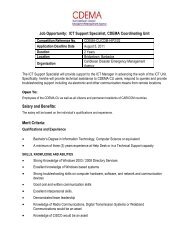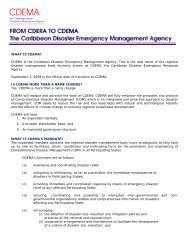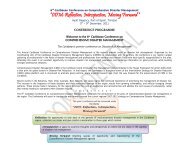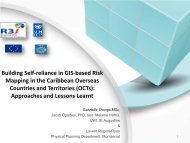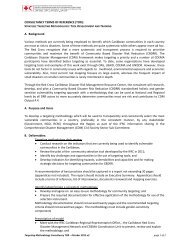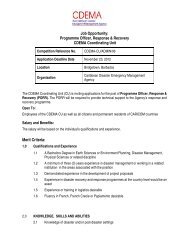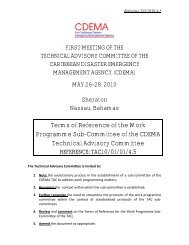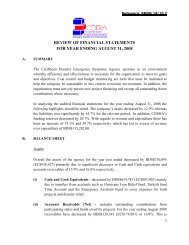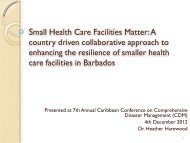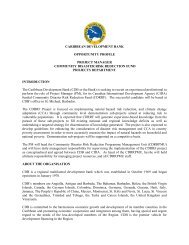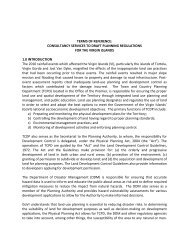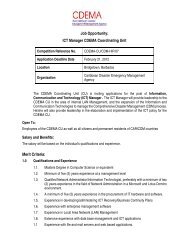Create successful ePaper yourself
Turn your PDF publications into a flip-book with our unique Google optimized e-Paper software.
e) venues be selected that are not be associated with particular factions or elites so that everyone feels<br />
comfortable in the space;<br />
f) venues are laid out in ways that encourage equitable participation (e.g. U-shaped tables or desks in circles,<br />
rather than head tables and rows of seating) and with space for break-out groups;<br />
g) the selection of the days and timing of the workshop take account of people’s livelihood activities and<br />
religious activities.<br />
CANARI will also advise <strong>CDEMA</strong> what equipment and materials it requires in order to facilitate the workshops<br />
(and these will also be highlighted in the Module and Handbooks). Where possible, CANARI and <strong>CDEMA</strong><br />
should seek to identify someone from the country where the workshop is being held to present the local<br />
context with regard to climate change adaptation.<br />
As well as the evaluation session with participants at the end of the workshop, CANARI will debrief the<br />
workshop with <strong>CDEMA</strong> and any participating CSSSC members, to develop a consensus on any changes<br />
needed to the Programme, Module or Handbooks. Initial revisions will be made within two weeks of the<br />
conclusion of the two workshops and revised versions will be used for the Training the Trainers Workshop.<br />
3.3.7. Facilitate Regional Training of Trainer’s workshop in the use of the Community-based Climate<br />
Change and Disaster Risk Reduction Programme and Tools (Handbooks and Module)<br />
3.3.7.1. Overview<br />
CANARI will facilitate a three-day workshop to be held in either Jamaica or Trinidad and Tobago (to minimise<br />
facilitator travel time and costs). The workshop will be facilitated by Nicole Brown and Sarah McIntosh and will<br />
pilot the Module, Participant’s and Trainer’s Handbooks.<br />
<strong>CDEMA</strong> will select one or two persons from each <strong>CDEMA</strong> Participating State to participate in the workshop, up<br />
to a maximum of 30 persons. The workshop will be conducted in English. <strong>CDEMA</strong> will be responsible for all<br />
logistical arrangements including participant travel, accommodation, meals, selection of venue, securing of the<br />
necessary equipment etc.<br />
The overall aim of the workshop will be to build the capacity of key persons in each country, such as national<br />
disaster risk reduction coordinators and community facilitators and animators, to facilitate and support effective<br />
responses to climate change and disasters at the community level, and to explain climate change adaptation<br />
and disaster risk reduction and their relationship.<br />
The workshop will also provide a useful opportunity for participants to share relevant experiences and case<br />
studies from their respective countries. It will also begin the process of networking for mutual support,<br />
providing the foundation for creating a network of facilitators, which could subsequently be supported by<br />
<strong>CDEMA</strong> and its partners through activities such as:<br />
a) dynamic updating of the electronic versions of the Module and Handbooks, to incorporate the latest<br />
scientific research, new case studies and resources;<br />
b) hosting of a moderated online forum on <strong>CDEMA</strong>’s website for discussion of issues, methodologies,<br />
sharing of experiences between scientists, community stakeholders and facilitators etc.;<br />
c) provision of space on <strong>CDEMA</strong>’s website to showcase audio-visual materials produced in communities<br />
or about community-level responses;<br />
<br />
continuous upgrading of facilitator skills and knowledge through traditional or online courses.<br />
Relevant topics might include those highlighted as essential components of a full MCCCDRR<br />
Programme and other areas of capacity building such as<br />
o stakeholder analysis as a precursor to designing community interventions;<br />
14



